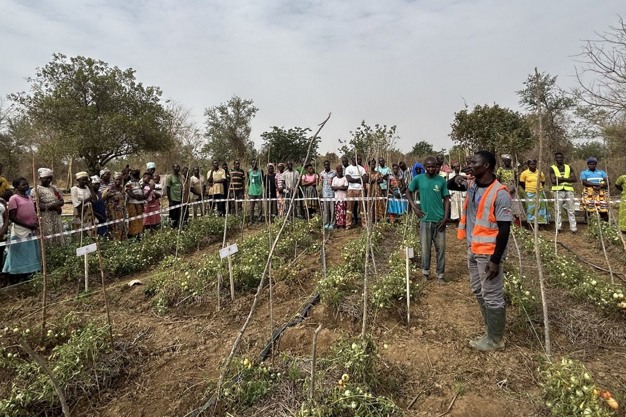Farmers were enlightened and excited about what they saw and heard during a field day on 29 February. It was a multifaceted event that aimed to empower farmers with new knowledge on good agricultural practices and provide a platform for information exchange and networking across the value chain.
This brought together 152 participants, half of them women, including vegetable farmers from different communities in the upper western part of Ghana, staff from the Department of Agriculture of the Ministry of Food and Agriculture, input dealers, and traders. The Ministry's Deputy municipal director expressed his enthusiasm about the field day, acknowledged its timely contribution to improving smallholder tomato production in the district, and how this aligns perfectly with the Ministry of Food and Agriculture Planting for Food and Jobs (PFJ 2.0) initiative. He emphasized that organizing field days and training sessions is crucial, but finding the resources to do so remains a challenge.

The day kicked off with an insightful session from Paul Zaato of the World Vegetable Center on the importance of good agronomic practices at different stages in tomato cultivation. Farmers were then guided through the tomato demonstration trials, where they witnessed good agronomic practices firsthand. A field officer from the Ministry provided insights on disease and pest identification, stressing the need for early interventions to ensure healthy plant growth. Nutrient management was also highlighted, with a focus on achieving an optimal balance for robust development. Farmers toured trial plots where tomatoes were grown using different organic amendments and were impressed with the healthy plants and the abundant, high-quality fruit. They also saw the effects of using an innovative compost produced from the frass of the black soldier fly, that is being tested by project partners across various countries.
Participants actively engaged in discussions, sharing their experiences and their concerns about conventional farming practices. When helping to harvest tomatoes from each treatment, one woman farmer noted that "Yields of fruits from using dagaa kuolong are ok" – organic fertilizers in the local language. On seeing the high yields from using organic amendments with their own eyes, many stated that the economic benefits will be enormous. Women farmers especially said that the high cost of chemical fertilizers was a limitation for them – with a 50 kg sack of NPK costing up to US$40. They were happy to hear that organic fertilizers were cheaper and equally if not more effective, as another women farmer concluded, "With a constant supply of compost, we can increase production and have enough money to take care of our family needs."
This work is part of the 'Vegetable Compact within the Technology for African Agriculture Transformation Project Phase II' (TAAT II), funded by the African Development Bank. Implementation is led by the International Institute of Tropical Africa (IITA) in partnership with the World Vegetable Center and national partners in Benin, Ghana, Rwanda, and Tanzania.
Source: avrdc.org
